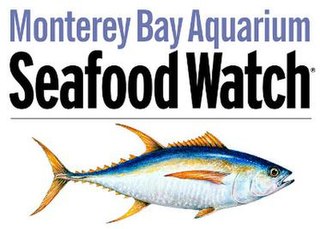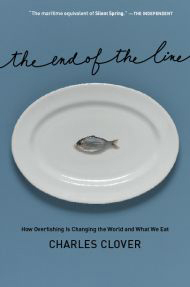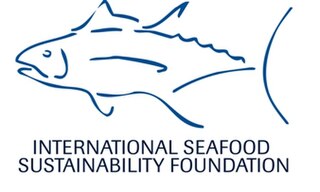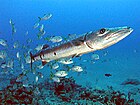
Seafood is any form of sea life regarded as food by humans. Seafood prominently includes fish and shellfish. Shellfish include various species of molluscs, crustaceans, and echinoderms. Historically, sea mammals such as whales and dolphins have been consumed as food, though that happens to a lesser extent in modern times. Edible sea plants, such as some seaweeds and microalgae, are widely eaten as seafood around the world, especially in Asia. In North America, although not generally in the United Kingdom, the term "seafood" is extended to fresh water organisms eaten by humans, so all edible aquatic life may be referred to as seafood. For the sake of completeness, this article includes all edible aquatic life.

Sashimi is a Japanese delicacy consisting of very fresh raw fish or meat sliced into thin pieces and often eaten with soy sauce.

A conventional idea of a sustainable fishery is that it is one that is harvested at a sustainable rate, where the fish population does not decline over time because of fishing practices. Sustainability in fisheries combines theoretical disciplines, such as the population dynamics of fisheries, with practical strategies, such as avoiding overfishing through techniques such as individual fishing quotas, curtailing destructive and illegal fishing practices by lobbying for appropriate law and policy, setting up protected areas, restoring collapsed fisheries, incorporating all externalities involved in harvesting marine ecosystems into fishery economics, educating stakeholders and the wider public, and developing independent certification programs.

The Marine Stewardship Council (MSC) is an independent non-profit organization which sets a standard for sustainable fishing. Fisheries that wish to demonstrate they are well-managed and sustainable compared to the science-based MSC standard are assessed by a team of experts who are independent of both the fishery and the MSC. Seafood products can display the blue MSC ecolabel only if that seafood can be traced back through the supply chain to a fishery that has been certified against the MSC standard.

Seafood Watch is one of the best known sustainable seafood advisory lists, and has influenced similar programs around the world. It is best known for developing science-based seafood recommendations that consumers, chefs, and business professionals use to inform their seafood purchasing decisions.

Illegal, unreported and unregulated fishing (IUU) is an international issue around the world. Industry observers believe IUU occurs in most fisheries, and accounts for up to 30% of total catches in some important fisheries.
John West Foods is a United Kingdom-based seafood marketing company established in 1857, and currently owned by Thai Union Group of Thailand. They are known as a producer of canned salmon and tuna, and also supply mackerel, sardine, herring, brisling, anchovies and shellfish.

The End of the Line: How Overfishing Is Changing the World and What We Eat is a book by journalist Charles Clover about overfishing. Clover, a former environment editor of the Daily Telegraph (London) and now a columnist on the Sunday Times (London), describes how modern fishing is destroying ocean ecosystems. He concludes that current worldwide fish consumption is unsustainable. The book provides details about overfishing in many of the world's critical ocean habitats, such as the New England fishing grounds, west African coastlines, the European North Atlantic fishing grounds, and the ocean around Japan. The book concludes with suggestions on how the nations of the world could engage in sustainable ocean fishing.
Sustainable seafood is seafood that is either caught or farmed in ways that consider the long-term vitality of harvested species and the well-being of the oceans, as well as the livelihoods of fisheries-dependent communities. It was first promoted through the sustainable seafood movement which began in the 1990s. This operation highlights overfishing and environmentally destructive fishing methods. Through a number of initiatives, the movement has increased awareness and raised concerns over the way our seafood is obtained.

Canada's fishing industry is a key contributor to the success of the Canadian economy. In 2016, Canada's fishing industry exported $6.6 billion in fish and seafood products and employed approximately 72,000 people in the industry. Aquaculture, which is the farming of fish, shellfish, and aquatic plants in fresh or salt water, is the fastest growing food production activity in the world and a growing sector in Canada. In 2015, aquaculture generated over $1 billion in GDP and close to $3 billion in total economic activity. The Department Of Fisheries and Oceans (DFO) oversees the management of Canada's aquatic resources and works with fishermen across the country to ensure the sustainability of Canada's oceans and in-land fisheries.
Friend of the Sea is a project for the certification and promotion of seafood from sustainable fisheries and sustainable aquaculture. It is the only certification scheme which, with the same logo, certifies both wild and farmed seafood. Friend of the Sea started as a project of the Earth Island Institute, the NGO which operates the successful International Dolphin-Safe project. Some of the main world retailers participate, such as Carrefour Italy, Coop Italia, Eroski, Manor and Finiper. Some important producers also have their products certified.

The aquaculture of salmonids is the farming and harvesting of salmonids under controlled conditions for both commercial and recreational purposes. Salmonids, along with carp, and tilapia are the three most important fish species in aquaculture. The most commonly commercially farmed salmonid is the Atlantic salmon. In the U.S. Chinook salmon and rainbow trout are the most commonly farmed salmonids for recreational and subsistence fishing through the National Fish Hatchery System. In Europe, brown trout are the most commonly reared fish for recreational restocking. Commonly farmed nonsalmonid fish groups include tilapia, catfish, sea bass, and bream.
SeaWeb is a nonprofit ocean conservation organization. Their mission is to raise public awareness, to advance science-based solutions and mobilize decision-makers around ocean conservation. SeaWeb was founded in 1996 by the Environment Group of the Pew Charitable Trust as an initiative to promote ocean conservation issues for Americans. In 1999, SeaWeb became an independent 501(c)3 organization, funded mostly from private charitable foundations, but also from individual contributions. In 2015, SeaWeb became part of The Ocean Foundation.

International Seafood Sustainability Foundation (ISSF) was formed in 2009 as a global, non-profit partnership among the tuna industry, scientists and World Wide Fund for Nature. The group states its mission is to undertake science-based initiatives for the long-term conservation and sustainable use of tuna stocks, reducing bycatch and promoting ecosystem health. Regional Fisheries Management Organizations (RFMOs) are primarily responsible for managing the world’s tuna stocks—skipjack, yellowfin and albacore tuna, the species most commonly processed for canned and shelf-stable tuna products, but their parliamentary procedures too often allow the short-term economic and political interests of nations to prevent sustainable measures from being adopted. ISSF works to ensure that effective international management practices are in place to maintain the health of all the tuna stocks.
The Nauru Agreement Concerning Cooperation in the Management of Fisheries of Common Interest, or The Nauru Agreement is an Oceania subregional agreement between the Federated States of Micronesia, Kiribati, the Marshall Islands, Nauru, Palau, Papua New Guinea, Solomon Islands and Tuvalu. The eight signatories collectively control 25–30% of the world's tuna supply and approximately 60% of the western and central Pacific tuna supply.

Thai Union Group is a Thailand-based producer of seafood-based food products. It was founded in 1977, and was listed on the Stock Exchange of Thailand (SET) on 22 November 1994.
Gulf Wild is a nonprofit organization operating in the Gulf of Mexico. Gulf Wild works with commercial fishermen to encourage and facilitate fishery conservation and innovation. Gulf Wild has implemented traceability practices including placing a numbered gill tag on every Gulf Wild fish. This numbered tag tracks who harvested the fish, from where, and at what port the fish landed. Consumers can use the gill tag number to access this information via the Gulf Wild website.















